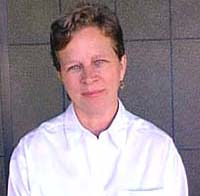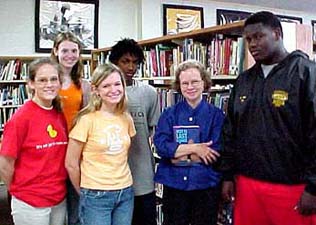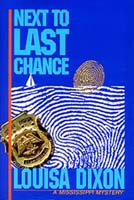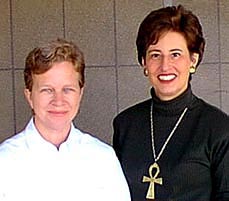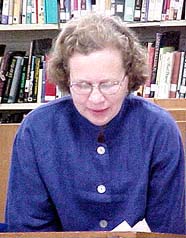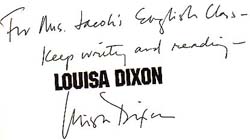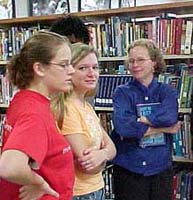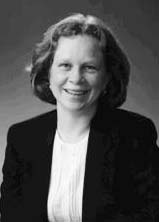Major Works
- Next to Last Chance: A Mississippi Mystery (Spring, 1998)
- Outside Chance (September, 1999)
- Never Had a Chance (working title of book in progress)
Biography of Louisa Dixon
By Chris Johnson, SHS
Although she now lives in Jackson, Mississippi, Louisa Dixon was born in Stanford, Connecticut, on March 31, 1950, but grew up mainly in New Canaan, Connecticut, a suburb of New York City. Her parents, Paul R.B. Dixon and Louisa O. Dixon, had five children: Peter, Lucian, Mary, Louisa, and Edwin (deceased). She attended New Canaan High School and then moved on to Antioch College in Yellow Springs, Ohio, where she studied for two quarters. After Antioch College, she attended Ohio State University in Columbus, Ohio, achieving her B.S. in Clinical Psychology and graduating Summa Cum Laude. Later, she attended Creighton University School of Law in Omaha, Nebraska, where she got her J.D. in 1977.
While clerking for Judge Albert Schatz in the U.S. Federal District Court in Omaha, Nebraska, she managed to meet a tall, handsome, aspiring attorney by the name of Jerry Johnson, who was working for the Justice Department. They then met again when Louisa took a job in the Special Counsel’s office at the Department of Energy in Washington, D.C., where he was working. In April of 1981, they were married. Their son, Ben Johnson, was born in 1989.
Louisa Dixon has worked many different and interesting jobs. She has been a teaching assistant at a Montessori school, a campaign worker in the John Glenn Presidential Campaign, and in 1984 she became Director of Investigations in the State Auditor’s office of Mississippi. In 1988, she became the first woman Commissioner of Public Safety for the State of Mississippi. In between fighting crooks on the roads and Mississippi legislators, she was raising a son. After the election of Republican Governor Fordice in 1991, and his taking office in 1992, Louisa resigned and decided to raise her young son Ben Johnson, who was two at the time. A few years later Louisa started the Rosemont, Ltd., which publishes children’s activity materials. She now is the president of Greenfield Plantation, Inc., her family owned timber farm in Natchez, Mississippi.
Louisa has been happily married seventeen years and enjoys raising her son, who is now ten. Her book, Next to Last Chance, is the first in a series of Laura Owen’s sagas, which she has been working on since 1994. Her second book, Outside Chance, has just been published (September, 1999). In addition, she has a contract for a third book in the trilogy of Laura Owen mysteries called Never Had a Chance. Besides being a mother, wife, and writer, she likes to read nonfiction in a hammock or work in the garden and hopes to one day build a dark room and work on photography.
Reviews
A Review of Next to Last Chance
by Chris Johnson, SHS
Next to Last Chance is the first novel by Louisa Dixon, former Mississippi Director of Public Safety and the only woman to ever head the highway patrol. Her mystery is an interesting and entertaining novel of politics, crime, and corruption. Next to Last Chance tells of the decaying within the Mississippi political community. The main characters in this story are Laura Owen, the main character and definitely not a southern boy, who is appointed Commissioner of Public Safety and head of the State Patrol by Governor Gibbs Carver, a man with national political goals who hopes to raise his own image by appointing the highly criticized Laura, but she has a way of proving her critics wrong.
Laura accepts the appointment after heading an assault by the State Auditor on local officials. Following her appointment Laura loses her husband (and her son is injured) in a car crash involving a doped up driver. As Commissioner, she changes course and decides on attacking the war on drugs and sets out to earn the respect of her troopers. She later encounters strong opposition by U.S. Attorney Alex Marcum, the federal prosecutor who intends to succeed Governor Carver. He grows bitter with the up and coming Laura, but Marcum’s intentions are not solely political. Only Laura Owen and her determined patrol officers can bring an end to Marcum’s contriving criminal enterprise and put a stop to his quest for popular offices. I really enjoyed the book and recommend it to everyone.
An Interview with Louisa Dixon
by Chris Johnson, SHS
Where and when were you born?
Stamford, Connecticut, March 31, 1950.
Where did you grow up?
New Canaan, Connecticut, a suburb of New York City.
What are your parents’ names, brothers’ and/or sisters’ names?
Parents: Paul R. B. Dixon and Louisa O. Dixon.
Brothers and sisters: Peter O. Dixon, Lucian W. Dixon, Mary O. Dixon and Edwin B. Dixon (deceased). I was the fourth.
Where did you attend high school, college and any other type of university (law, medical, etc.)?
New Canaan High School; Antioch College- Yellow Springs, Ohio (two quarters); Ohio State University- Columbus, Ohio (B. S. 1973 Clinical Psychology, Summa Cum Laude.); Creighton University School of Law- Omaha, Nebraska. (J. D. 1977)
Tell me a little bit about your husband and son. (ages, where you met, etc.)
My husband, Jerry Johnson , is an attorney, born and raised in Mississippi. We met in U.S. Federal District Court in Omaha, NE, when he was working for the Justice Department, and I was clerking for Judge Albert Schatz. Then we met again when I took a job in the Special Counsel’s office at the Department of Energy in Washington, D.C. where he was working. We were married in April 1981. Our son, Ben Johnson, was born in 1989.
What previous jobs have you had?
In chronological order: baby-sitter, gift wrapper in a gift shop, tutor, waitress at a summer resort hotel, teaching assistant at a Montessori school; office assistant at a moderate income housing project; research assistant at a psych experiment lab; installer and office assistant in a burglar alarm company; assembly line worker in an aluminum window and door company; assistant in a library; legal research assistant; manager of legal research project; law clerk on the U.S. Eighth Circuit Court of Appeals; law clerk on the U.S. District Court; attorney-U.S. Department of Energy; assistant for a catering supply business; campaign worker for the John Glenn Presidential Campaign; Director of Investigations, State Auditor’s office for MS; Commissioner of Public Safety for MS; member, MS Ethic Commission; president- Rosemont, Ltd- publishing children’s activity materials; consultant- Deposit Guaranty National Bank; president, Greenfield Plantation, Inc., a timber farm in Natchez., Mississippi.
How do you spend your spare time?
If I ever have any, at the movies, in my garden, or in the hammock, reading. I’d really like to build a dark room and work on photography again.
Tell me how, in what way, the book is based on your life.
Next to Last Chance, and the entire Laura Owen crime novel series, are based on my experiences in Mississippi state government–heavily. But there are a myriad of other details from my life such as the funeral described in Next ( very similar to my brother Ed’s funeral where I read the passage from Romeo and Juliet). And we did have a rifle range in the attic.
Who is your favorite author?
That’s a difficult question– I don’t have just one. But I enjoy Anne Lamont (Bird by Bird, Operating Instructions), K.C. Constantine (Police Procedurals), John McPhee.
What person do you think has influenced you the most?
That’s an impossible question. I’ve encountered so many people along the way who have shown me what real courage and determination are about. My parents, brothers, and sister were major sources of inspiration, certainly; one of my high school teachers introduced me to the world of classical music and literature; but my husband is probably my strongest single influence, introducing me to a wide variety of music, literature, and opinions.
Why did you decide to write about Laura Owens as the subject of your book Next toLast Chance?
I guess the adage “write what you know” is applicable. Not until my experiences at the Highway Patrol did I have a cohesive base of material to put a book together.
When did you become interested in writing? Was there something in particular that got you interested in writing?
I’ve always written letters and told stories. In high school, I was on the literary journal staff and dabbled in projects. But it never occurred to me that I could write a book, and I didn’t try until 1994.
What kind of student were you in high school and college?
In high school, I was pretty good student, always on the honor roll, but never on the high honor roll. In college, I was very conscientious, ( I was paying my way through, so I didn’t want to waste my money) and graduated Summa Cum Laude. In law school, I worked incredibly hard the first year and made honors; then slid a little in my second and third years when I was working.
How long did it take you to write Next to Last Chance? Where did you get the idea for this book?
If I was writing one book, without other projects interrupting me, it would take a year from start to finish. I began writing when my brother and I talked about writing a screenplay based on an event at the Highway Patrol. When that was finished, I began working on a novel version of the same event.
Are you working on a new book right now? If so, do you have a title for it yet, and what is it about?
The second in the series is What You Don’t See, [now called Outside Chance] is slated for September, 1999, publication. (Since this interview Outside Chance has been published.) The manuscript has been turned in, and I’m waiting to hear back from the editor. The third is Cold Treatment, slated for September 2000 and under my contract, that manuscript must be submitted by June 1999. And then I’ll get back to the fourth, which has a working title of The Ultimate Sacrifice.
(Since Chris’s interview the publisher and author have changed the titles. Here is the information sent to us February 3, 1999, by Louisa Dixon:
I thought you ought to know that my editor suggested and the publisher concurred that the titles of Books 2 and 3 should change. What You Don’t See (man fakes his death and disappears) will become Outside Chance, and Cold Treatment (about a serial killer) will become No Chance. I haven’t settled on a change for Ultimate Sacrifice (a trooper is left dead on the side of the road), but my current favorite is Never Had A Chance— so that could be identified as the working title. You can see the pattern.
If anyone is bored and looking for something to do, I’m gathering all the variations on Chance that are out there–Slim Chance, Fat chance, etc.
Thanks – Louisa
Have you received any awards for anything not pertaining to the book?
First prize in an open photography competition in Alexandria, VA. High school service awards.
Do you have any advice for future writers?
Learn to type before you have bad hunt and peck habits; read widely; take the roads less traveled.
Do you have any advice for students today?
Read as much as possible, write as much as possible, and don’t worry about what you’ll do when you grow up- yet. Be open to ideas. This is the last chance you have to just soak in everything that comes your way. And don’t quit your day job!
How has Mississippi or living in Mississippi influenced your writing?
First off, it’s my subject, but more importantly, the rich tradition of story telling and writing has been all around me. Maybe that’s what finally got me going.
Did you base the characters in your book on people you know or knew?
The characters are composites of people I know. Some bit characters are drawn very close to the mark.
Related Websites
- Amazon customer reviews of Outside Chance.
Bibliography
- Dixon, Louisa. Email interview by Chris Johnson. December 1, 1998.
- Dixon, Louisa Visit to English class at SHS. October 18, 1998.
- Next to Last Chance. Online <http://www.ebicom.net/genisis/next_to_last_chance.html> 27 October, 1998. Genesis Press.
- Patterson, J.C. The Clarion Ledger “Tales of Highway Patrol.” 20 September, 1998.

